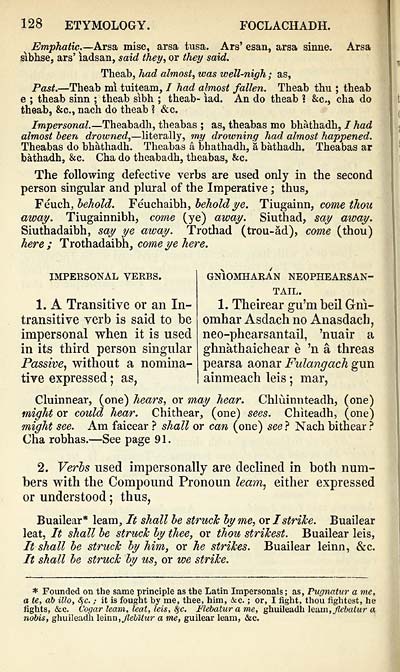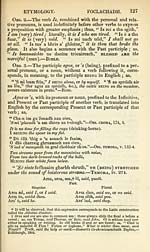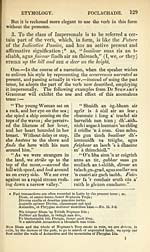Books and other items printed in Gaelic from 1841 to 1870 > Stéidhean a' Ghràmair Ghaëlig
(156) Page 128
Download files
Complete book:
Individual page:
Thumbnail gallery: Grid view | List view

128 ETYMOLOGY.
FOCLACHADH.
Emphatic. — Arsa mise, arsa tusa. Ars' esan, arsa sinne. Arsa
sìbhse, ars' ìadsan, said they, or they said.
Theab, had almost, was well-nigh ; as,
Past. — Theab mì tuiteam, / had almost fallen. Theab thu ; theab
e ; theab sinn ; theab sìbh ; theab- ìad. An do theab ì &c, cha do
theab, &c, nach do theab ? &c.
Impersonal. — Theabadh, theabas ; as, theabas mo bhàthadh, / had
almost been drowned, — literally, my drowning had almost happened.
Theabas do bhàthadh. Theabas à bhathadh, à bàthadh. Theabas ar
bàthadh, &c. Cha do theabadh, theabas, &c.
The following defective verbs are used only in the second
person singular and plural of the Imperative ; thus,
Feuch, behold. Fèuchaibh, behold ye. Tiugainn, come thou
away. Tiugainnibh, come (ye) away. Siuthad, say away.
Siuthadaibh, say ye away. Trothad (trou-àd), come (thou)
here ; Trothadaibh, come ye here.
IMPERSONAL VERBS.
1. A Transitive or an In-
transitive verb is said to be
impersonal when it is used
in its third person singular
Passive, without a nomina-
tive expressed ; as,
GNIOMHARAN NEOPHEARSAN-
TAIL.
1. Theirear gu'm beil Gnì-
omhar Asdach no Anasdach,
neo-phearsantail, 'nuair a
ghnàthaichear è 'n à threas
pearsa aonar Fulangach gun
ainmeach leis ; mar,
Cluinnear, (one) hears, or may hear. Chlùinnteadh, (one)
might or could hear. Chithear, (one) sees. Chìteadh, (one)
might see. Am faicear ? shall or can (one) see ? Nach bithear ?
Cha robhas. — See page 91.
2. Verbs used impersonally are declined in both num-
bers with the Compound Pronoun leam, either expressed
or understood ; thus,
Buailear* leam, It shall be strucJc byme, or Istrilce. Buailear
leat, It shall be struck by thee, or thou strihest. Buailear leis,
It shall be struclc by him, or he striles. Buailear leinn, &c.
It shall be struch by us, or we striTce.
* Founded on the same principle as the Latin Impersonals ; as, Pugnatur a me,
a te, ab illo, SfC. ; it is fought by me, thee, him, &c. ; or, I fight, thou fightest, he
fights, &c. Cogar leam, leat, leis, Sfc. Flebatura me, ghuileadh leam, flebatur a
nobis, ghuileadh le'mn,flebitur a me, guilear leam, &c.
FOCLACHADH.
Emphatic. — Arsa mise, arsa tusa. Ars' esan, arsa sinne. Arsa
sìbhse, ars' ìadsan, said they, or they said.
Theab, had almost, was well-nigh ; as,
Past. — Theab mì tuiteam, / had almost fallen. Theab thu ; theab
e ; theab sinn ; theab sìbh ; theab- ìad. An do theab ì &c, cha do
theab, &c, nach do theab ? &c.
Impersonal. — Theabadh, theabas ; as, theabas mo bhàthadh, / had
almost been drowned, — literally, my drowning had almost happened.
Theabas do bhàthadh. Theabas à bhathadh, à bàthadh. Theabas ar
bàthadh, &c. Cha do theabadh, theabas, &c.
The following defective verbs are used only in the second
person singular and plural of the Imperative ; thus,
Feuch, behold. Fèuchaibh, behold ye. Tiugainn, come thou
away. Tiugainnibh, come (ye) away. Siuthad, say away.
Siuthadaibh, say ye away. Trothad (trou-àd), come (thou)
here ; Trothadaibh, come ye here.
IMPERSONAL VERBS.
1. A Transitive or an In-
transitive verb is said to be
impersonal when it is used
in its third person singular
Passive, without a nomina-
tive expressed ; as,
GNIOMHARAN NEOPHEARSAN-
TAIL.
1. Theirear gu'm beil Gnì-
omhar Asdach no Anasdach,
neo-phearsantail, 'nuair a
ghnàthaichear è 'n à threas
pearsa aonar Fulangach gun
ainmeach leis ; mar,
Cluinnear, (one) hears, or may hear. Chlùinnteadh, (one)
might or could hear. Chithear, (one) sees. Chìteadh, (one)
might see. Am faicear ? shall or can (one) see ? Nach bithear ?
Cha robhas. — See page 91.
2. Verbs used impersonally are declined in both num-
bers with the Compound Pronoun leam, either expressed
or understood ; thus,
Buailear* leam, It shall be strucJc byme, or Istrilce. Buailear
leat, It shall be struck by thee, or thou strihest. Buailear leis,
It shall be struclc by him, or he striles. Buailear leinn, &c.
It shall be struch by us, or we striTce.
* Founded on the same principle as the Latin Impersonals ; as, Pugnatur a me,
a te, ab illo, SfC. ; it is fought by me, thee, him, &c. ; or, I fight, thou fightest, he
fights, &c. Cogar leam, leat, leis, Sfc. Flebatura me, ghuileadh leam, flebatur a
nobis, ghuileadh le'mn,flebitur a me, guilear leam, &c.
Set display mode to:
![]() Universal Viewer |
Universal Viewer | ![]() Mirador |
Large image | Transcription
Mirador |
Large image | Transcription
Images and transcriptions on this page, including medium image downloads, may be used under the Creative Commons Attribution 4.0 International Licence unless otherwise stated. ![]()
| Rare items in Gaelic > Books and other items printed in Gaelic from 1841 to 1870 > Stéidhean a' Ghràmair Ghaëlig > (156) Page 128 |
|---|
| Permanent URL | https://digital.nls.uk/101713471 |
|---|
| Description | Out-of-copyright books printed in Gaelic between 1631 and 1900. Also some pamphlets and chapbooks. Includes poetry and songs, religious books such as catechisms and hymns, and different editions of the Bible and the Psalms. Also includes the second book ever published in Gaelic in 1631. |
|---|

